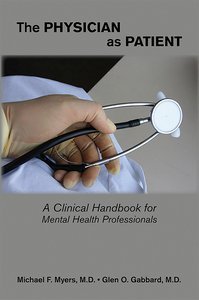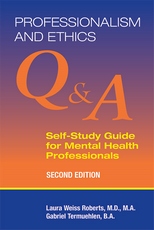The Physician as Patient
A Clinical Handbook for Mental Health Professionals
View Pricing
Description
Because physicians are shaped by the expectations and responsibilities of their profession and are especially susceptible to stress and illness, professionals treating them need to be attuned to a host of demands and considerations not applicable to other patients. The Physician as Patient meets that need by combining the perspectives of two seasoned psychiatrists who have been assessing and treating physicians for more than 30 years. Drs. Myers and Gabbard pool their career-long dedication to physician health, counseling, and risk management to demonstrate that, through accurate diagnosis and state-of-the-art treatment, most impaired physicians can recover and return to practice.
As the most current sourcebook available on this subject, The Physician as Patient not only discusses common illnesses and problems seen in doctors but also outlines the many biopsychosocial treatments that are indicated—always with an emphasis on integrated care. It considers such issues as the reluctance of physicians to assume the role of patient and the uniqueness of the physician's psychological makeup that facilitates or impedes diagnosis and treatment. It describes the most common medical and psychiatric illnesses in physicians—including addictions—and addresses personality disorders and the increasingly important subject of boundary violations. And it helps readers determine what can be done about doctors behaving badly or out-of-character, or what strategies are useful in treating physicians to assure accuracy while also diminishing morbidity and relieving suffering. Among other key issues raised are:
- The importance of considering sociocultural customs and values when treating the increasing number of minority and International Medical Graduate physicians
- Addressing the many clinical, humanistic, ethical, and legal dimensions of the psychiatric evaluation of physicians
- Distinguishing between long-standing patterns of personality disorders that manifest as disruptive behaviors and those patterns that lead to burnout and depression
- Assessing amenability to rehabilitation in cases of sexual boundary violation, including an awareness of alcohol or drug abuse as contributing factors
- Utilizing a physician's predisposition as a learner and pragmatist to enter into cognitive behavior therapy
- The success of early diagnosis and treatment in lowering the occurrence of suicide, for which physicians are notoriously at risk
Brimming with case examples, The Physician as Patient adopts a reader-friendly style that facilitates quick grasp of concepts, while an extensive list of references and websites provides an entree for additional support. This book is an indispensable resource for all mental health professionals who take caregivers into their care.
Contents
- Introduction
- Part I: Physician Characteristics and Vulnerabilities
- Chapter 1. The Psychology of Physicians and the Culture of Medicine
- Chapter 2. Minority Physicians (Racial, Ethnic, Sexual Orientation) and International Medical Graduates
- Chapter 3. Psychiatric Evaluation of Physicians
- Part II: Diagnostic and Treatment Issues in the Distressed and Distressing Physician
- Chapter 4. Psychiatric and Medical Illness in Physicians
- Chapter 5. Addictions: Chemical and Nonchemical
- Chapter 6. Personality Disorders, Personality Traits, and Disruptive Physicians
- Chapter 7. Professional Boundary Violations
- Part III: Prevention, General Treatment Principles, and Rehabilitation
- Chapter 8. Psychodynamic Psychotherapy
- Chapter 9. Individual Cognitive Therapy and Relapse Prevention Treatment
- Chapter 10. Couples in Conflict and Their Treatment
- Chapter 11. The Suicidal Physician and the Aftermath of Physician Suicide
- Chapter 12. Prevention
- Appendix: Resources and Web Sites
- References
- Index
About the Authors
Michael F. Myers, M.D., is Director of the Marital Therapy Clinic at St. Paul's Hospital and Clinical Professor in the Department of Psychiatry at the University of British Columbia in Vancouver, Canada.
Glen O. Gabbard, M.D., is Brown Foundation Chair of Psychoanalysis and Professor in the Department of Psychiatry and Behavioral Sciences and Director of the Baylor Psychiatry Clinic at Baylor College of Medicine in Houston, Texas. He is also Training and Supervising Analyst at the Houston–Galveston Psychoanalytic Institute in Houston, Texas.
Related Products
Carousel Control - items will scroll by tabbing through them, otherwise arrows can be used to scroll one item at a time








